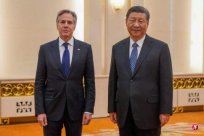Source: Bloomberg
Jonathan TIRRONE
The supervisors who want to control the emerging generation of artificial intelligence (AI) weapons may not have much time.
As the independent weapon system spreads rapidly in the Ukraine and Gasha battlefields, algorithms and drones are helping military planners to decide whether to strike a certain goal.Soon, such a decision may be completely completed by the machine.
"This is the moment of Obonhamimer," Alexander Schallenberg, Austrian Foreign Minister.He refers to the J. Robert Aubenheimer, who participated in the invention of the atomic bullet in 1945. Obonheimer later began to advocate the spread of nuclear weapons.
Civil, military and technical officials from more than 100 countries gathered in Vienna on Monday to discuss how their economies can control the combination of AI and military technology -these two industries have recently attracted investors and pushed stock valuations to push their stock valuations.Rate to historical high.
Alphabet Inc.'s AI platform DeepMind Technologies, Jaan Tallinn, said that the spread of global conflicts, coupled with enterprises to promote the development of AI for economic benefits, increasing the difficulty of controlling independent weapons.
"The motivation to motivate Silicon Valley may not be consistent with the rest of humans," Tallinn said.
Governments from all over the world have taken measures to cooperate with enterprises to include AI tools into defense.The Pentagon of the United States is investing a lot of funds from the AI startup. Last week, the European Union also provided funds to Thales SA to establish a image database to evaluate the battlefield goals.
Tel Aviv Media +972 Magazine reported this month that Israel is using an AI program called "Lavender" to determine the assassination goal.Israel denied the report.It is reported that the AI system "played a core role in the Palestinian unprecedented bombing."
"The future of the killing robot has arrived," said physicist Anthony Aguirre."We need a military -controlling treaty negotiated by the United Nations General Assembly." AGUIRRE predicts that the technology of the technology in the future developed more than 1.6 million views in 2017.
However, Alexander Kmentt, the highest level official of the Austrian discharge and the planner of this week's meeting, said that the advocates of diplomatic solutions may be frustrated, at least in the short term.
"Classic military control methods cannot work, because it is not involved in a single weapon system, but a combination of a series of dual -use technologies," KMENTT said in an interview.
Instead of reaching a new "great work" treaty, KMENTT hinted that countries may be forced to respond to existing legal tools.He said that the implementation of export control and humanitarian law can help control the spread of the AI weapon system.
The Costa Rican Foreign Minister Arnoldo André Tinoco predicts that in the long run, after non -national behavior, even terrorists can obtain this technology, countries will be forced to write new regulations.
"Autonomous weapons are easily available, and only a few people can restrict the restrictions of military reserve competitions," he said."Now, as long as there is a 3-D printer and basic programming knowledge, students can also make drones capable of causing large-scale casualties. The autonomous weapon system has always changed the concept of international stability."



